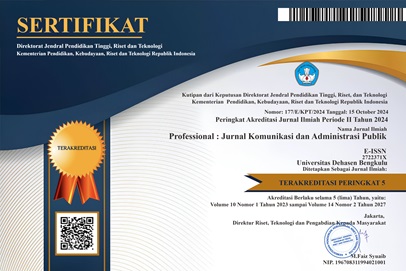Implementasi Program Sekolah Siaga Kependudukan (Studi Kasus di SMA Negeri 1 Bengkulu Selatan)
Abstract
This study aims to describe the implementation of the Population Alert School in SMAN 1 South Bengkulu. The method used is descriptive qualitative. The informants of this study were 9 people who were involved in the SSK. Collection techniques with interviews, observation, and documentation. Data analysis techniques through the stages of data collection, data reduction, data presentation and drawing conclusions. Based on field findings, the results of the research can be concluded, namely: (1) SMAN 1 South Bengkulu has prepared a policy foundation in the form of decree, financial support, facilities and infrastructure, preparing human resources by including teachers in SSK training. (2) Implementing PBM in accordance with the RPP by including material 8 family functions, visits to agencies related to SSK, students have been able to integrate SSK material with the ability to analyze population data and population problems, as well as the existence of students' understanding of quality families and young marriage. (3) Evaluation of the implementation of SSK shows that the school has a Population Corner, the values of eight family functions are internalized in students, students have understood about reproductive health, maturation of marital age and the importance of quality family. (4) There are obstacles in activities such as: lack of budget funds for activities and infrastructure, and not all activities can be integrated in extracurricular subjects and activities, and limited documentation.
Downloads
Copyright (c) 2022 Sarifah Aini

This work is licensed under a Creative Commons Attribution-ShareAlike 4.0 International License.





